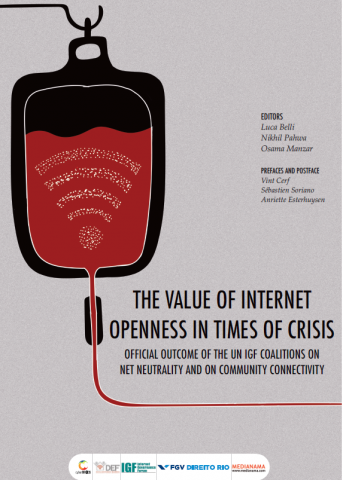Session
Round Table - U-shape - 90 Min
The Covid19 pandemic has demonstrated that free and non-discriminatory Internet access is essential. This session will discuss the importance of net neutrality and Internet openness at times of crisis. Panellists, will discuss case studies, strategies and national norms explored in the contributions to the DCNN annual outcome (developed in partnership with DC3): the report on The Value of Internet Openness at Times of Crises”
The session will have a tripartite structure featuring:
1) Presentations of the contributions to the DCNN annual outcome report
2) Discussion of the latest net neutrality evolutions in light of the covid19 pandemic
3) Identification of new challenges and cooperation opportunities to be considered by the future work of DCNN
This session will discuss the importance of Internet openness at times of crisis. Panellists, will discuss case studies, strategies and national norms explored in the contributions to the DCNN annual outcome (developed in partnership with the IGF Coalition on Community Connectivity, DC3): the report on "The Value of Internet Openness at Times of Crisis”
The current pandemic has demonstrated that non-discriminatory Internet access is both valuable and essential. DCNN members have been exploring this internet openness, since the inception of the Coalition, providing an open platform for stakeholders to discuss shared principles, norms, rules, decision-making procedures, and programmes that shape the evolution and use of the Open Internet. A clear example is the joint publication of the Model Framework on Net Neutrality, utilised by the Council of Europe as a basis for the elaboration of the CoE recommendation on net neutrality. (See this expert report ( https://rm.coe.int/16805a09ca ) introducing the Model Framework, which originated the elaboration of the CoE Recommendation CM/Rec(2016)1 of the Committee of Ministers on Network Neutrality https://search.coe.int/cm/Pages/result_details.aspx?ObjectID=09000016805c1e59 )
Research developed by the Coalition has also been explicitly included in national policy documents, such as the inclusion of the Zero Rating Map, developed by DCNN and featured in the 2018 Report on the “State of the Internet’ of the French Telecoms Regulator (ARCEP) https://www.arcep.fr/uploads/tx_gspublication/report-state-internet-2018_conf050618-ENG.pdf
Panellists' interventions will not be limited to their contributions to the report on "The Value of Internet Openness at Times of Crisis” and will try to identify new challenges related to Internet Openness that could be addressed by the Coalition.
The proposal aims at discussing the value of network neutrality and non discriminatory Internet access in times of emergencies, such as the covid19 pandemic. The issue is considered highly pressing and timely in many internet governance and policy circles, well beyond the network neutrality community.
Luca Belli, FGV
- Luca Belli, FGV
- Anriette Esterhuysen, MAG Chair
- Nikhil Pawha, Medianama
- Frode Sorensen, Norwegian Telecoms Regulator (Nkom)
- Aurore Tual, French Telecoms Regulator (ARCEP)
- KS Park, Korea University Law School/Open Net
- Smriti Parsheera, National Institute of Public Finance and Policy in New Delhi
- Apar Gupta, Internet Freedom Foundation
- Anya Orlova, CyberBRICS
- Andrey Shcherbovich, Higher School of Economics, Moscow
- Alejandro Pisanty, Autonomous University Mexico
GOAL 9: Industry, Innovation and Infrastructure
GOAL 10: Reduced Inequalities
Report
Areas of broad support/agreement:
- COVID-19 has significantly increased internet usage and connectivity demand. More than ever, people need the internet to stay connected to their professional, social and cultural environments.
- The current connectivity infrastructure has successfully dealt with the sudden increase in traffic load, without major breakdowns in connectivity worldwide. The problem is lack of access more than traffic load.
- End-user's rights must be safeguarded and Net neutrality rules are key.
- Net neutrality is an essential element of Internet Openness but to preserve openness more must be done e.g. the coalition should consider working on Interoperability and on device neutrality.
- Exceptional connectivity measures taken by ISPs should still be in accordance with net neutrality and an open internet. Examples in various jurisdictions indicate the pathways to the implementation of these measures without offending users’ rights or restricting Internet openness. Some examples also reveal the issues with policy choices that do not carefully observe these standards.
- Internet shutdowns and surveillance measures taken without adequate safeguards represent a concrete menace to the freedom of speech and expression. Net neutrality plays a central part in providing internet openness and realizing such fundamental rights.
Luca Belli, FGV
Anriette Esterhuysen, MAG Chair
Frode Sorensen, Norwegian Telecoms Regulator (Nkom)
Aurore Tual, French Telecoms Regulator (ARCEP)
KS Park, Korea University Law School/Open Net
Smriti Parsheera, National Institute of Public Finance and Policy in New Delhi
Apar Gupta, Internet Freedom Foundation
Anya Orlova, CyberBRICS
Andrey Shcherbovich, Higher School of Economics, Moscow
Alejandro Pisanty, Autonomous University Mexico
The Value of Internet Openness in Times of Crisis
This volume explores “The Value of Internet Openness in Times of Crisis” and is the official outcome of the Coalitions on Net Neutrality and on Community Connectivity of the United Nations Internet Governance Forum. This work stems from the consideration that the COVID-19 pandemic has harshly highlighted the fundamental importance of Internet access, and the total exclusion that the unconnected face in times of crises. Internet connectivity, has now emerged as the backbone of all social, political and economic interactions along with services during the Covid-19 pandemic. The current crisis brings to light that digital infrastructures play an essential role, shaping our development. The sustainability of such development relies on Internet openness and this book offers an ample range of perspectives exploring why it is more crucial than ever to guarantee that the Internet stays a smooth-running, open, and accessible common good.
THE AUTHORS OF THIS BOOK ARE (IN ORDER OF APPEARANCE): Vint Cerf, Sébastien Soriano, Luca Belli, Osama Manzar, Sarah Farooqui, Dhanaraj Thakur, Teddy Woodhouse, Sonia Jorge, Frode Sørensen, Apar Gupta, Sidharth Deb, Smriti Parsheera, Rolf H. Weber, Senka Hadzic, Pablo Aguera, Alison Gillwald, Alejandro Pisanty, LocNet Team, Carlos Baca, Erik Huerta, Karla Velasco, Anna Orlova, Andrey Shcherbovich, Daniela Parra, Amali De Silva-Mitchell, Nikhil Pahwa, and Anriette Esterhuysen.
The volume is also available in ebook here https://online.fliphtml5.com/gnel/fsbp/#p=1
